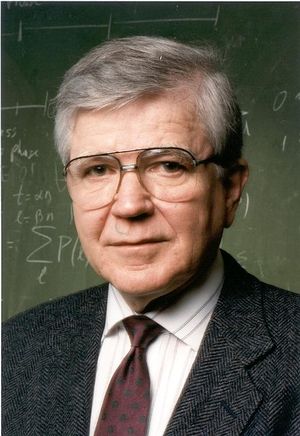Robert G. Gallager: Difference between revisions
No edit summary |
No edit summary |
||
| Line 1: | Line 1: | ||
[[Image:Robert G. Gallager 2269.jpg|thumb|left]] | [[Image:Robert G. Gallager 2269.jpg|thumb|left]] | ||
== Robert G. Gallager == | == Robert G. Gallager == | ||
| Line 14: | Line 14: | ||
Gallager was on the [[IEEE Information Theory Society History|IEEE Information Theory Society's]] Board of Governors from 1965 to 1970 and 1979 to 1988, and was its president in 1971. He was elected an IEEE Fellow in 1968 and a member of the NAE in 1979. He was awarded the IEEE Medal of Honor in 1990, "For fundamental contributions to communications coding techniques." | Gallager was on the [[IEEE Information Theory Society History|IEEE Information Theory Society's]] Board of Governors from 1965 to 1970 and 1979 to 1988, and was its president in 1971. He was elected an IEEE Fellow in 1968 and a member of the NAE in 1979. He was awarded the IEEE Medal of Honor in 1990, "For fundamental contributions to communications coding techniques." | ||
See also: [[Oral-History:Robert Gallager|Robert Gallager Oral History]] | |||
[[Category:Communications]] [[Category:Computers_and_information_processing]] [[Category:Information_theory]] [[Category:Data_systems]] | [[Category:Communications]] [[Category:Computers_and_information_processing]] [[Category:Information_theory]] [[Category:Data_systems]] | ||
Revision as of 18:04, 13 October 2009
Robert G. Gallager
Robert G. Gallager was born in Philadelphia, Pennsylvania on 29 May 1931. He received the BSEE degree in electrical engineering from the University of Pennsylvania in 1953, and the S.M. and Sc.D. degrees in electrical engineering from the Massachusetts Institute of Technology in 1957 and 1960, respectively.
Following two years at Bell Telephone laboratories and two years military service in the Signal Corps, in 1956 he joined the Department of Electrical Engineering and Computer Science at M.I.T. He was the Fujitsu Professor of Electrical Engineering, Co-director of the laboratory for Information and Decision systems, and Co-chairman of the Department Area I (Control, Communication, and Operations Research).
Gallager's early work on information theory focused on the reliability function of noisy channels (i.e., the exponential rate at which error probability can be driven to 0 with increasing code length). The resulting paper, "A Simple Derivation of the Coding Theorem and Some Applications'" won the 1966 IEEE Baker Prize, and contributed to many later developments in coding. His book, Information Theory and Reliable Communication (Wiley 1968) generalized these earlier results along with many new results. This book remains the standard graduate text and reference work for the field. Gallager's recent information theory work focuses on multiaccess communication.
In the mid 1970's, Gallager's research focus shifted to data networks. He is well known for his work on distributed algorithms, routing, congestion controls and random access techniques. Data Networks (Prentice Hall, 1988), co-authored with D. Bertsekas, helped provide a conceptual foundation for this field.
Gallager was involved in the founding of Codex Corporation in 1962. His fundamental studies on quadrature amplitude modulation and detection led directly to the 9600 bps modems that provided Codex's commercial success. His inventions in coding and modulation led to four patents.
Gallager was on the IEEE Information Theory Society's Board of Governors from 1965 to 1970 and 1979 to 1988, and was its president in 1971. He was elected an IEEE Fellow in 1968 and a member of the NAE in 1979. He was awarded the IEEE Medal of Honor in 1990, "For fundamental contributions to communications coding techniques."
See also: Robert Gallager Oral History
